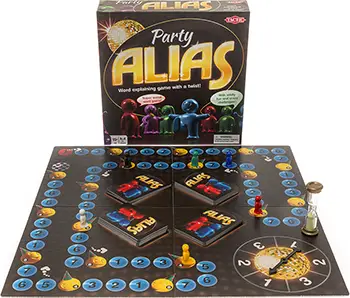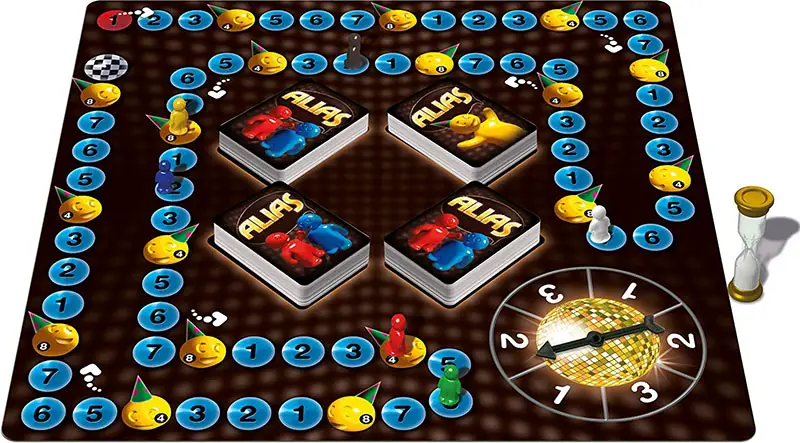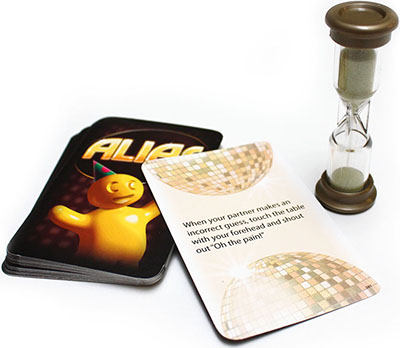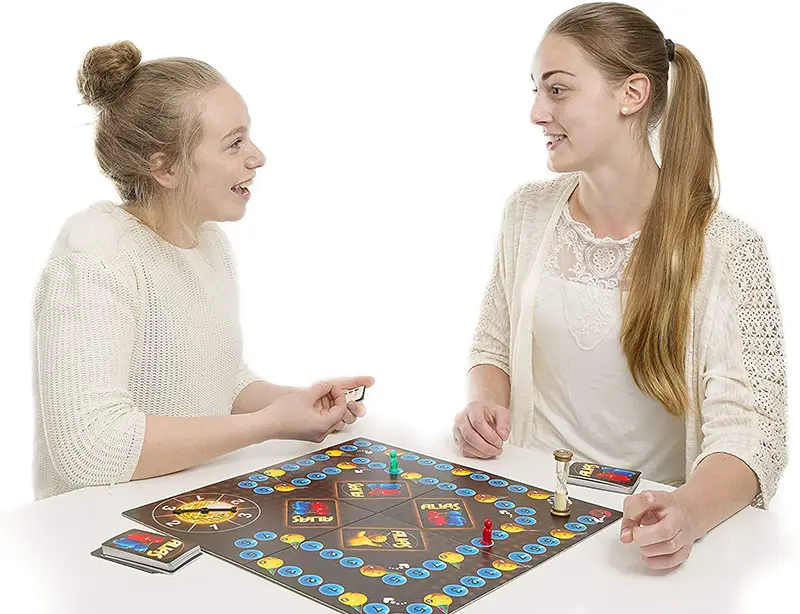
Party Alias is a side-splitting version of this popular game. In Party Alias you use wacky new ways to explain every time your team stops at a Party space!

Components
- Gameboard with spinner
- 6 playing pawns 292 Word cards
- 50 ZAP cards
- 50 SILENT cards
- 8 SMILEY cards
- Sand timer
- Instructions
Object of the Game
Alias is one of the most well-known and loved Tactic classics. The game is played in teams of two or more people, and the object is to explain words using other words like synonyms, opposites and other clues.
Do your best to get your teammates to guess as many words as possible before the time is up.
The team will move forward on the game board as many steps as you guessed words correctly. The first team to reach the finish space wins!

Setup

Shuffle the word cards 1 and Party cards 2 separately.
Make three stacks out of the word cards and place them on the designated spots on the game board. Place the Party cards face down on the designated spot.
Attach the spinner arrow to the allotted spot on the game board 3.
It's a good idea to ensure that there is enough space around the table to perform some of the crazier Party challenges! Divide into teams. If there are more than 2 players in any team, please see Team rules. Each team picks a pawn and places it in the Start space 4.
Game Play
-
The spaces on the game board are numbered 1-8. The space your pawn stands on will determine which word on the word card to explain. The players in each team will take turns explaining.
-
The first team to explain will agree on who will explain first. The explaining player picks up a stack of word cards. Turn the timer and start explaining. Whenever the team gets a word right, the explaining player places the card aside, and begins to explain a new word of the same number from the next card.
-
When the time is up, the other teams say "Stop!". If the last word hasn't been guessed yet, the other teams can also take part in guessing it. The team that gets the word right wins one point and can move their pawn one step forward on the game board.
-
The number of words guessed correctly is the number of steps the team can move their pawn forward on the game board (see Minus points).
-
The player who was the last to explain returns the used word cards to the bottom of the stack. Now it's the next team's turn to explain.
-

On the game board, you'll also find Party spaces. If a team's pawn is in a Party space at the start of their turn, the words are explained differently (see Party spaces).
If a team successfully completes a Party challenge, they can spin the spinner and move forward as many extra steps as the spinner shows.
-
The first team to reach the finish space win the game!

Explaining
The words on the cards are not in any particular order. There are verbs, adjectives, nouns, people, places and colors etc. on the cards. It is entirely up to chance what kind of words your team will end up explaining.

You can start explaining as soon as the sand timer is turned. Give as many hints and guesses as you can until the word is guessed correctly or the sand in the timer runs out. However, the most important thing to remember is that this is a party game - don't take these rules too seriously! Agree among yourselves on how much flexibility there is.
The guessed word has to be exactly right. The explaining player helps the guessers to find the correct form.
If the word has two parts and someone guesses the first part, you can then use it in your explanation.
You can't use any part of the explained word in your explanation. For example, the word "football" may not be explained by saying "a ball that is kicked with a foot". You could say, for example, "a round object that you try to kick into a goal".
You can use opposites. The word "big" can be explained as "the opposite of small". You cannot use foreign languages unless all the players agree to this.
Minus Points
If the explaining player makes a mistake, for example says a part of the word in the card, the word will not be accepted and the team receives a minus point.
The other teams must, therefore, listen closely when the team in turn is explaining. One minus point equals one step backwards on the game board.
For example: if a team has guessed 6 words correctly, but the explainer has made two mistakes, the team gets to move 4 spaces forward (6 - 2 = 4).
If the word seems too difficult, you can skip it, but remember that it also causes your team a minus point. However, this is sometimes a good idea since it may save a lot of time.

Party Spaces
Party Alias contains new, silly ways of explaining, which are used whenever a team starts their turn in one of the Party spaces on the game board.
After a successful Party challenge, they can move their pawn forward according to the number of correctly guessed words, as well as spin the spinner that will show the number of extra steps (1-3). The sand timer is usually used as normal when performing Party challenges.
Each Party card contains a description of what the explainer, guesser (and sometimes the other players) are supposed to do during the explaining. When the other players are involved, they have to act quickly so as to not hinder the play of the active team.
After reading the Party card, the active team can choose to explain using the normal style, but in that case they have to move their pawn 5 steps backwards on the game board.
When in a Party space, reveal the top card from the Party deck before the sand timer is turned, and read aloud the description. After everyone understands what they need to do the timer is turned and the explaining can start.
If the team have followed the Party card's instructions successfully until the time runs out, they get to spin the spinner and move as many extra steps as it shows!
Team Rules
If your team consists of 3 or more players you will have to choose one player to be the explainer, and only one player to be the guesser for each Party turn. During all regular turns, one team member explains and the rest guess. Change roles every turn.
Continue Reading


